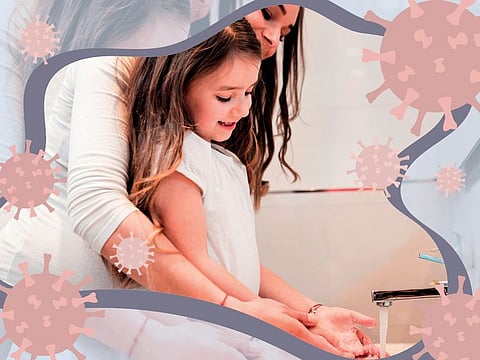COVID-19: What UAE parents need to know about Coronavirus
Expert advice on how to keep babies, small children and pregnant mums safe

Dr Anuradha Gunasekharan, specialist paediatrician at Aster Speciality Clinic, International City, gives her tips on staying safe.
Is the corona virus more dangerous for babies and small children than it is for adults?
Fortunately, no. The current data shows that the infection risk is lower for children and young infants when compared with adults. Children under the age of 19 account for just two percent among those affected and death from COVID-19 is less likely in children.
As well as the normal measures, such as hygiene and avoiding big crowds, what else can be done to protect a baby or child from this virus?
First and foremost, the measure which is going to be very effective in preventing COVID and other respiratory viruses is hand hygiene.Children and adults should perform hand washing in a good manner
Wash hands often – especially before eating, after blowing your nose, coughing or sneezing and after going to the bathroom.
If soap and water are not readily available, use an alcohol-based hand sanitizer with at least 60 percent alcohol. Parents should carry hand sanitizers, disposable tissues and wet wipes for their children when going outside.
Ensure door-knobs and arm rests are cleaned with wet wipes if you happen to use public transport or public toilets. Avoid unnecessary contact with stray animals.
Avoid close contact with anyone who has cold, or flu-like symptoms. Seek medical care early if you or your child has a cough, fever and/or difficulty in breathing. Teach appropriate use and disposal of masks and respiratory hygiene. Teach children not to touch their eyes, nose and mouth with unwashed hands. Teach kids to cough, or sneeze, into tissue paper and dispose of it properly.
Divulge the correct travel history if you have had any contact with someone who has returned recently from any of the global hotspots for COVID-19. Update the vaccination status of your kid with emphasis on flu vaccine.
Being aware of the general preventive and protective measures would be helpful not only for COVID-19 but for common respiratory and diarrheal illnesses too. Any re-emerging or new infectious threats can also be tackled effectively by adopting basic precautionary steps in public health.
There are a lot of tips being shared around the community, such as drinking water every 15 minutes, taking a teaspoon of coconut oil daily and more. Are there any that you think hold any merit?
I would like to quote the words of the Director-General of the World Health Organsiation, Dr Tedros Adhanam Ghebreyesus, who said, “We’re not just fighting an epidemic, we are fighting an infodemic.’ To this date, there is no scientific evidence that any alternate remedies can prevent, or cure, the illness caused by this virus. Relying on unverified information may undermine the most effective preventive measures like hand and respiratory hygiene.
Are there any vitamins that we can increase in our children’s diets in order to help keep our kids healthy and resilient against the virus?
Though micronutrients like vitamin C and zinc may be helpful to individuals who have deficiencies, no scientific evidence is available at present to prescribe specific vitamins and minerals to keep kids, or adults, resilient against the virus. A well-balanced diet and regular physical activity will be good enough for enhancing the innate immunity of the children and maintaining the readiness of our immune system to new challenges.
What about pregnant mums? How would the coronavirus impact them and their baby?
Fortunately, pregnant women are not that affected by this infection and no mother-to-baby transmission of COVID-19 has been reported yet. There are no reports on fetal malformations unlike the Zika virus either.
Do you have any specific advice for pregnant mums?
There’s no need to panic at all. Keep your mind calm and happy. Follow the advice of your doctors and practice hand hygiene measures. Stay away from sick people. Update your flu vaccine status.
Is there anything else you would like to add?
In the era of smart phones and communication over social media, false messages related to health are traveling at lightning speed. Kindly approach health experts for clarifications and do not believe all information you receive on social media unless it’s verified by the authorities and authentic.
Visit www.asterclinic.ae.
Why are children less affected by the Coronavirus?
Dr Frank Esper, pediatric infectious disease specialist at Cleveland Clinic Children’s, shares his insights. How does COVID-19 from other similar viruses? It is very surprising to me. Not only because there are so few deaths in children with this coronavirus, but because there have been very few infections found at all. There are many coronaviruses out there and four of them seem to spread in humans every year. We oftentimes find coronaviruses both in adults and children at fairly comparable numbers. Based on what we have seen in China, this coronavirus has a substantial predisposition for older people. Why might this be? Right now there are only theories. One thought is that smoking could be a big factor in getting infected and gravely sick with this coronavirus. Obviously smoking occurs more often in adults and the older you are, the longer you may have smoked putting you at higher risk. Another theory is pollution. Older individuals have lived longer breathing in pollution which may put their lungs at risk for this coronavirus. What does this mean for parents of babies and young children? I was reassured when I saw that few children were getting sick. However, it’s not zero. There still are children and even a few infants that have become infected. Visit www.clevelandclinicabudhabi.ae.
Read more:
Sign up for the Daily Briefing
Get the latest news and updates straight to your inbox



